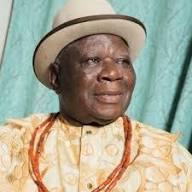Life And Times Of Late Edwin Clark
Tunde Omoniyi
Edwin Clark, a towering figure in Nigerian politics and a staunch advocate for the Ijaw people, passed away on February 17, 2025, at the age of 97. His life spanned decades of political influence, national service, and philanthropy, leaving an unforgettable mark on Nigeria’s governance and educational landscape.
Edwin Clark was born on May 25, 1927, in Kiagbodo, Delta State. He attended primary and secondary schools in Effurun, Okrika, and Afugbene before furthering his studies at the Government Teacher Training College, now known as Delta State University, Abraka. He was also the younger brother of the renowned Nigerian poet J.P. Clark.
Clark worked briefly as a schoolteacher before pursuing a law degree abroad. During his time in London, he was actively involved in student activism, particularly through the West African Students’ Union.
His political career began in 1953 when he was elected as a Councillor for Bomadi under the National Council of Nigeria and the Cameroons (NCNC). In 1966, he played a significant role in shaping the Mid-Western Region’s political direction,Clark was among a group of delegates from the Mid-West who opposed any ideas of confederation that were raised at an ad-hoc constitutional conference set up by Gowon in 1966. The delegation’s mandate was Nigerian unity and when proposals of a loose federation were tabled, the region’s delegates asked for adjournment. Clark served under Governor Samuel Ogbemudia from 1966 to 1975 and later became Federal Commissioner for Information in 1975. In 1983, he was briefly elected as a senator before the military takeover ended the Shagari administration.

During the second republic, he was a member of the national executive committee of the National Party of Nigeria (NPN) and was the treasurer of the party in Bendel State (now, in part, Delta State and previously the Mid-Western Region province). In 1983, he was an elected senator for three months at the twilight of the Shagari administration.
Beginning in 1996, Clark has been a self-described leader of the Ijaw nation. He supported the Ijaw ethnic group in Delta State during an ethnic crisis in Warri and has led Ijaw leadership delegations to meet political leaders.
Clark was an unofficial advisor to President Goodluck Jonathan.He was a philanthropist who founded the Edwin Clark Foundation and established a university in his hometown.Committed to education, Clark established Edwin Clark University in 2015 to provide higher education opportunities in his home state.
Beyond politics, he was a philanthropist who founded the Edwin Clark Foundation, which focuses on supporting education and social development. His contributions helped uplift many communities and individuals.
Clark was a passionate advocate for democracy, social justice, and national restructuring, dedicating his life to these causes over several decades. During his 97th birthday celebration in May, he called on President Bola Tinubu to prioritize restructuring as a means to address Nigeria’s pressing security, economic, and political challenges. He is remembered for his significant contributions to governance, education, and regional advocacy. His impact endures through the institutions he built and the causes he championed, ensuring that his legacy lives on for future generations.



